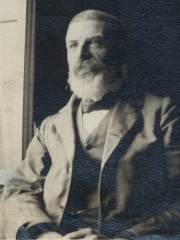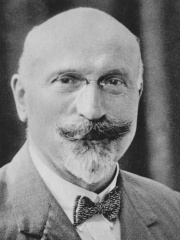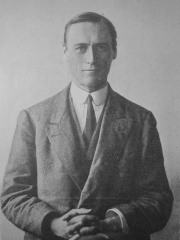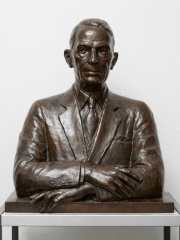



The Most Famous
ENGINEERS from Switzerland
This page contains a list of the greatest Swiss Engineers. The pantheon dataset contains 389 Engineers, 5 of which were born in Switzerland. This makes Switzerland the birth place of the 14th most number of Engineers behind China, and Czechia.
Top 5
The following people are considered by Pantheon to be the most legendary Swiss Engineers of all time. This list of famous Swiss Engineers is sorted by HPI (Historical Popularity Index), a metric that aggregates information on a biography's online popularity.

1. Hans Albert Einstein (1904 - 1973)
With an HPI of 70.91, Hans Albert Einstein is the most famous Swiss Engineer. His biography has been translated into 28 different languages on wikipedia.
Hans Albert Einstein (May 14, 1904 – July 26, 1973) was a Swiss-American engineer, the second child and first son of physicists Albert Einstein and Mileva Marić. He was a long-time professor of hydraulic engineering at the University of California, Berkeley. Einstein was widely recognized for his research on sediment transport. To honor his outstanding achievement in hydraulic engineering, the American Society of Civil Engineers established the "Hans Albert Einstein Award" in 1988 and the annual award is given to those who have made significant contributions to the field.

2. Michele Besso (1873 - 1955)
With an HPI of 59.04, Michele Besso is the 2nd most famous Swiss Engineer. His biography has been translated into 16 different languages.
Michele Angelo Besso (25 May 1873 – 15 March 1955) was a Swiss-Italian engineer who worked closely with Albert Einstein.

3. Robert Maillart (1872 - 1940)
With an HPI of 59.03, Robert Maillart is the 3rd most famous Swiss Engineer. His biography has been translated into 19 different languages.
Robert Maillart (16 February 1872 – 5 April 1940) was a Swiss civil engineer who revolutionized the use of structural reinforced concrete with such designs as the three-hinged arch and the deck-stiffened arch for bridges, and the beamless floor slab and mushroom ceiling for industrial buildings. His Salginatobel (1929–1930) and Schwandbach (1933) bridges changed the aesthetics and engineering of bridge construction dramatically and influenced decades of architects and engineers after him. In 1991 the Salginatobel Bridge was declared an International Historic Civil Engineering Landmark by the American Society of Civil Engineers.

4. Pierre Cérésole (1879 - 1945)
With an HPI of 57.11, Pierre Cérésole is the 4th most famous Swiss Engineer. His biography has been translated into 16 different languages.
Pierre Cérésole or Ceresole (17 August 1879 – 23 October 1945) was a Swiss pacifist, remembered for founding the peace organisation Service Civil International (SCI) and the international workcamp movement.

5. Othmar Ammann (1879 - 1965)
With an HPI of 53.77, Othmar Ammann is the 5th most famous Swiss Engineer. His biography has been translated into 18 different languages.
Othmar Hermann Ammann (March 26, 1879 – September 22, 1965) was a Swiss-American civil engineer whose bridge designs include the George Washington Bridge, Verrazzano–Narrows Bridge, and Bayonne Bridge. He also directed the planning and construction of the Lincoln Tunnel.
People
Pantheon has 5 people classified as Swiss engineers born between 1872 and 1904. Of these 5, none of them are still alive today. The most famous deceased Swiss engineers include Hans Albert Einstein, Michele Besso, and Robert Maillart.
Deceased Swiss Engineers
Go to all RankingsHans Albert Einstein
1904 - 1973
HPI: 70.91
Michele Besso
1873 - 1955
HPI: 59.04
Robert Maillart
1872 - 1940
HPI: 59.03
Pierre Cérésole
1879 - 1945
HPI: 57.11
Othmar Ammann
1879 - 1965
HPI: 53.77
Overlapping Lives
Which Engineers were alive at the same time? This visualization shows the lifespans of the 5 most globally memorable Engineers since 1700.

